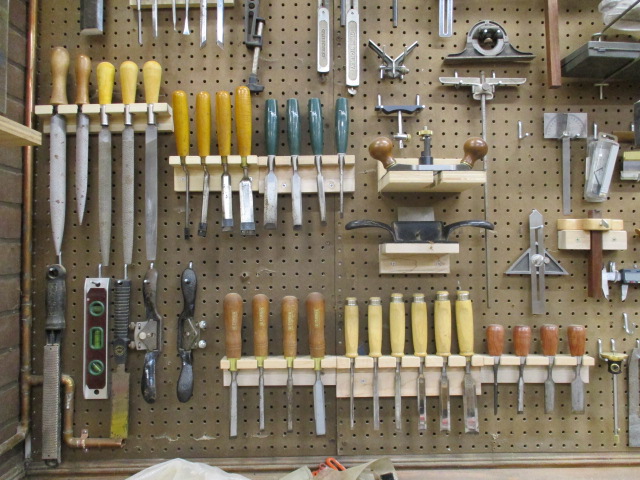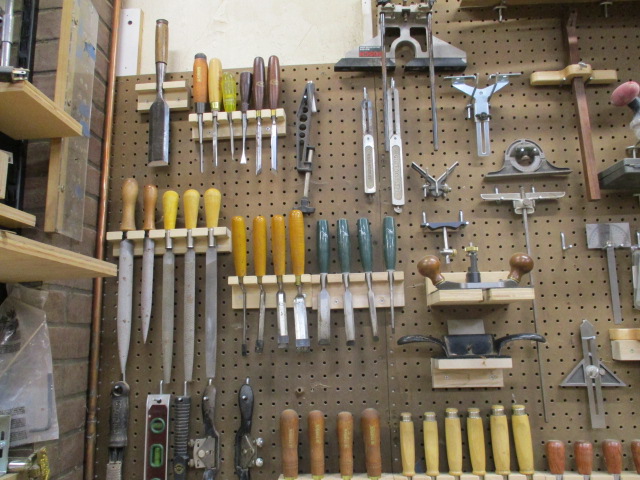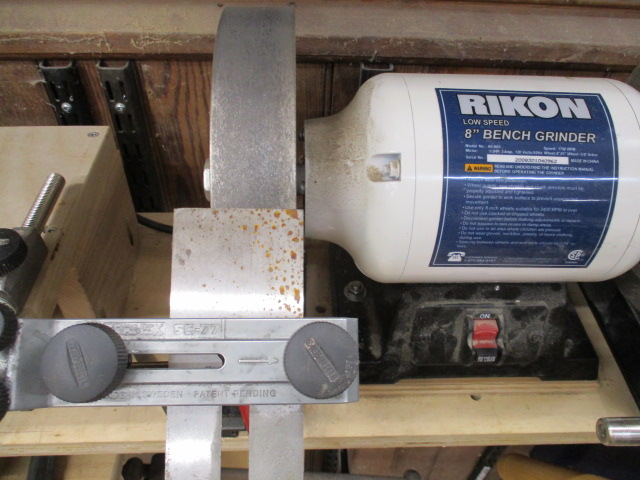05-22-2024, 07:51 PM
Trapper said he was considering the Veritas MK11 system. He also stated he hadn't warmed up to water stones inquired about. I said I use the Veritas system and would take some pictures. Here is my reply with pictures
I first learned about a Tormek machine at Holtsfest in little Amana back in the summer 1988. It was a craft fair in a field and there were some tool suppliers there. There was a guy that traveled the show circuit selling them. I played with it but i wasn't ready for the $325 and so I bought one the next year.. The machine didn't have a place for a horizontal bar and so on. Anyway it is a great machine at the time but slow. Today I use it mostly for sharpening knives. I use the leather strap for everything. The stone diameter is 7 7/8ths today not 10 inch's anymore


Here is my set up today I am not sure about the CBN wheels I think one is an 80 and the other one is a 360. The 80 is quite course and removes material very quickly. For example if you get a plane at a flea marked the blade usually needs a lot of reshaping. I grind the first or primary bevel angle at 22 1/2 degrees. I have my bars set so I just switch bars on the finer wheel.


As you can see from just the chisels on the wall one can spend a lot of time sharpening. I also have a collection of Keen Kutter K series planes both flat bottom and corrugated , not there yet but it will be 14 plane irons the take care of plus I also have several other planes so I can't spent all day re-sharpening. Anyway the two open drawers are where all the jigs fixtures honing paste. diamond plate and water stones are kept and what ever is kept




I do not want to get into a discussion of what I am doing wrong but I sharpen every thing at 25 degrees. I like 25 Degrees. 22 1/2 degrees included angle is the prefect cutting angle and 25 degrees is closer to prefect than 30. The pattern shop I worked in had their rest set at 27 1/2 because they worked in both soft and hard woods. I like 25 degrees and if you think differently then discuss it in your own post, not mine.


Below are some pictures of setting the rest bar for lathe gouges and the likes. I know that if I use the a hole to set my bar for chisels and plane iron and a distance of 1 7/8ths from the holding fixture base I will get a 22 1/2 degree grind on every thing. Even if the bar is moved set the bar to the A hole and set the blade off from my other gauge and grind. CBN on a slow speed grinder grinds cool enough so one doesn't need to worry and when the sparks come over the top of the tool it is done






I like the start honing with a 1000 diamond stone. I can push and pull the blade on at this stage. I use water out of my dehumidifier because there is no nothing in the water, no lime build up. I do not use a rust inhibitor. When Water evaporates it leaves a residue and eventual it will clog a diamond stone.. The coolant is checked on our grinders daily for the right amount of coolant. Part of the ISO for aerospace parts which is worse than just ISO certification. If coolant drips on the magnetic chuck it is miserable to get it off the next day after it is dried. I use a heat gun to dry the diamond. NO anything build up on the stone. I heat gun also works great for removing pressure sensitive sanding discs


I use the Veritas roller system on the diamond stone and the 4000- 8000 grit Waterstone I really like this system fast reliable and easy to use. I like the crowned roller for doing smoother blades . It crowns the blade and is all but fool proof at controlling the end results on the blade. You can take it out use it but it back in the holder and do a quick hone and go back to work.
I only pull when on the Waterstone. I do not want my edge digging in on a push cut. Once I stone the back of the iron with the finish stone I never touch that surface to a courser grit. A micro bevel is put on with the 1000, so only about 10 pull strokes on the two remaining stones and I am done, except for the leather wheel. the leather takes the edge to a whole different world in about 30 seconds


I like the Veritas system it is easy reliable and fool proof, although pricy. I have some filister planes that the angle of the blades are around 25 degrees off from square and I am considering getting their angle finer to help with that. When you cut a rabbit you want a flat bottom.
Anyway I am never more than 3 steps from start to finish when sharpening and even if I have a lot of reshaping to do it hardly ever take more than 5 minutes and usually it takes more time to get the stuff out than to touch up an edge.
I hope this helps.
Tom
I first learned about a Tormek machine at Holtsfest in little Amana back in the summer 1988. It was a craft fair in a field and there were some tool suppliers there. There was a guy that traveled the show circuit selling them. I played with it but i wasn't ready for the $325 and so I bought one the next year.. The machine didn't have a place for a horizontal bar and so on. Anyway it is a great machine at the time but slow. Today I use it mostly for sharpening knives. I use the leather strap for everything. The stone diameter is 7 7/8ths today not 10 inch's anymore

Here is my set up today I am not sure about the CBN wheels I think one is an 80 and the other one is a 360. The 80 is quite course and removes material very quickly. For example if you get a plane at a flea marked the blade usually needs a lot of reshaping. I grind the first or primary bevel angle at 22 1/2 degrees. I have my bars set so I just switch bars on the finer wheel.

As you can see from just the chisels on the wall one can spend a lot of time sharpening. I also have a collection of Keen Kutter K series planes both flat bottom and corrugated , not there yet but it will be 14 plane irons the take care of plus I also have several other planes so I can't spent all day re-sharpening. Anyway the two open drawers are where all the jigs fixtures honing paste. diamond plate and water stones are kept and what ever is kept


I do not want to get into a discussion of what I am doing wrong but I sharpen every thing at 25 degrees. I like 25 Degrees. 22 1/2 degrees included angle is the prefect cutting angle and 25 degrees is closer to prefect than 30. The pattern shop I worked in had their rest set at 27 1/2 because they worked in both soft and hard woods. I like 25 degrees and if you think differently then discuss it in your own post, not mine.

Below are some pictures of setting the rest bar for lathe gouges and the likes. I know that if I use the a hole to set my bar for chisels and plane iron and a distance of 1 7/8ths from the holding fixture base I will get a 22 1/2 degree grind on every thing. Even if the bar is moved set the bar to the A hole and set the blade off from my other gauge and grind. CBN on a slow speed grinder grinds cool enough so one doesn't need to worry and when the sparks come over the top of the tool it is done



I like the start honing with a 1000 diamond stone. I can push and pull the blade on at this stage. I use water out of my dehumidifier because there is no nothing in the water, no lime build up. I do not use a rust inhibitor. When Water evaporates it leaves a residue and eventual it will clog a diamond stone.. The coolant is checked on our grinders daily for the right amount of coolant. Part of the ISO for aerospace parts which is worse than just ISO certification. If coolant drips on the magnetic chuck it is miserable to get it off the next day after it is dried. I use a heat gun to dry the diamond. NO anything build up on the stone. I heat gun also works great for removing pressure sensitive sanding discs

I use the Veritas roller system on the diamond stone and the 4000- 8000 grit Waterstone I really like this system fast reliable and easy to use. I like the crowned roller for doing smoother blades . It crowns the blade and is all but fool proof at controlling the end results on the blade. You can take it out use it but it back in the holder and do a quick hone and go back to work.
I only pull when on the Waterstone. I do not want my edge digging in on a push cut. Once I stone the back of the iron with the finish stone I never touch that surface to a courser grit. A micro bevel is put on with the 1000, so only about 10 pull strokes on the two remaining stones and I am done, except for the leather wheel. the leather takes the edge to a whole different world in about 30 seconds

I like the Veritas system it is easy reliable and fool proof, although pricy. I have some filister planes that the angle of the blades are around 25 degrees off from square and I am considering getting their angle finer to help with that. When you cut a rabbit you want a flat bottom.
Anyway I am never more than 3 steps from start to finish when sharpening and even if I have a lot of reshaping to do it hardly ever take more than 5 minutes and usually it takes more time to get the stuff out than to touch up an edge.
I hope this helps.
Tom






